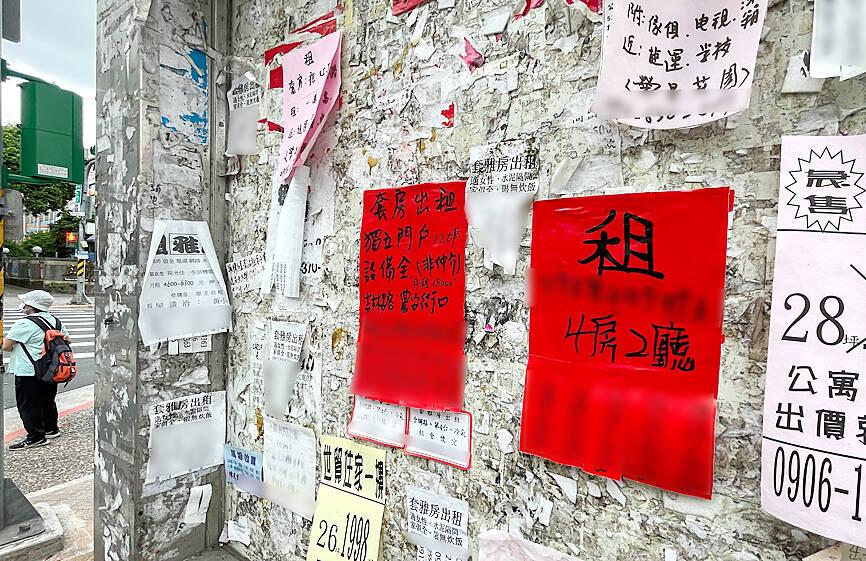Although Taiwan is moving toward more transparency in the rental market, 100 percent transparency is not possible, Minister of the Interior Liu Shyh-fang (劉世芳) said today.
In a meeting of the Legislative Yuan’s Internal Administration Committee, Liu and officials from the Executive Yuan’s Consumer Protection Committee and the Ministry of Finance presented a report on the state and future of the rental market.
The government fully records rental subsidies and social housing, which covers about 60 percent of the rental market, Liu said.

Photo: CNA
The Ministry of the Interior said that full rental price transparency runs the risk of obfuscating the actual situation of the market, difficulty in verifying actual rents, inaccurate information and disrupting the market.
Instead, the government should promote gradual transparency measures, the ministry said.
In the future, the ministry would collect rental subsidy data and publish rental statistics twice a year, it said.
Although lawmakers have asked the Ministry of the Interior to strengthen rent disclosure, even the total number of landlords and tenants is not clear, Chinese Nationalist Party (KMT) Legislator Ting Hsueh-chung (丁學忠) said.
It is difficult to fully ascertain the rental market due to the age of some homes and their locations, Liu said.
Furthermore, Taiwan’s respect for rule of law and individual privacy means that 100 percent transparency would be impossible to achieve, Liu added.
KMT Legislator Hsu Yu-chen (許宇甄) questioned whether fraudulent rental price reporting is illegal, to which Liu said that current laws do not mandate strict enforcement.
A comprehensive registration of all rental properties might also result in rent increases and housing shortages in urban areas such as New Taipei City, Liu said.
According to the relevant regulations, brokers can be punished for false rental declarations, but there are no penalties for private renters, Department of Land Administration acting head Lin Chia-cheng (林家正) said.

The Coast Guard Administration (CGA) yesterday said it had deployed patrol vessels to expel a China Coast Guard ship and a Chinese fishing boat near Pratas Island (Dongsha Island, 東沙群島) in the South China Sea. The China Coast Guard vessel was 28 nautical miles (52km) northeast of Pratas at 6:15am on Thursday, approaching the island’s restricted waters, which extend 24 nautical miles from its shoreline, the CGA’s Dongsha-Nansha Branch said in a statement. The Tainan, a 2,000-tonne cutter, was deployed by the CGA to shadow the Chinese ship, which left the area at 2:39pm on Friday, the statement said. At 6:31pm on Friday,

The Chinese People’s Liberation Army Navy’s (PLAN) third aircraft carrier, the Fujian, would pose a steep challenge to Taiwan’s ability to defend itself against a full-scale invasion, a defense expert said yesterday. Institute of National Defense and Security Research analyst Chieh Chung (揭仲) made the comment hours after the PLAN confirmed the carrier recently passed through the Taiwan Strait to conduct “scientific research tests and training missions” in the South China Sea. China has two carriers in operation — the Liaoning and the Shandong — with the Fujian undergoing sea trials. Although the PLAN needs time to train the Fujian’s air wing and

The American Institute in Taiwan (AIT) put Taiwan in danger, Ma Ying-jeou Foundation director Hsiao Hsu-tsen (蕭旭岑) said yesterday, hours after the de facto US embassy said that Beijing had misinterpreted World War II-era documents to isolate Taiwan. The AIT’s comments harmed the Republic of China’s (ROC) national interests and contradicted a part of the “six assurances” stipulating that the US would not change its official position on Taiwan’s sovereignty, Hsiao said. The “six assurances,” which were given by then-US president Ronald Reagan to Taiwan in 1982, say that Washington would not set a date for ending arm sales to Taiwan, consult

A Taiwanese academic yesterday said that Chinese Ambassador to Denmark Wang Xuefeng (王雪峰) disrespected Denmark and Japan when he earlier this year allegedly asked Japan’s embassy to make Taiwan’s representatives leave an event in Copenhagen. The Danish-language Berlingske on Sunday reported the incident in an article with the headline “The emperor’s birthday ended in drama in Copenhagen: More conflict may be on the way between Denmark and China.” It said that on Feb. 26, the Japanese embassy in Denmark held an event for Japanese Emperor Naruhito’s birthday, with about 200 guests in attendance, including representatives from Taiwan. After addressing the Japanese hosts, Wang